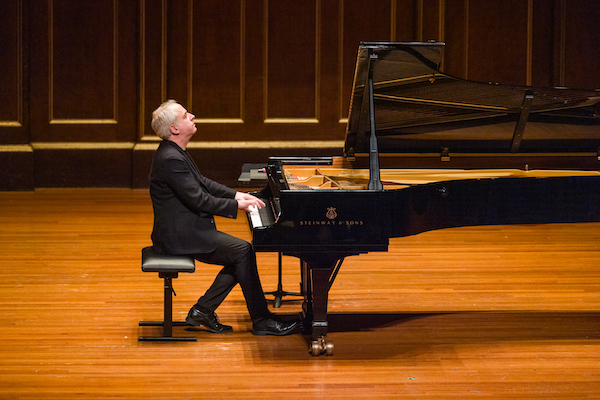Concert Review: Celebrity Series Presents Pianist Jeremy Denk — Embracing Contradictions
By Aaron Keebaugh
Pianist Jeremy Denk’s artistry rests in how he explores emotional variance by leaning into the extremes.

Jeremy Denk performing at Jordan Hall. Photo: Robert Torres
Jeremy Denk was so weary of the dominance that male composers still hold in the classical repertoire that he decided to do something about it. While stuck at home during the Covid lockdown, he turned his attention to old and new music by women. But programming individual pieces seemed to come off as mere tokenism. “They were just swallowed up in the patriarchy,” he said of his early post-Covid efforts.
So Denk proposed a welcome change. His latest program, heard at Jordan Hall last Saturday as part of the Celebrity Series, focused on music by 10 women. But this was more than just an act of defiance in the face of rigid tradition. Paired together in juxtaposition — as if in an iPod shuffle — were short pieces by Clara Schumann, Cécile Chaminade, Amy Beach, and Louise Farrenc, and music by Tania León, Missy Mazzoli, Meredith Monk, Ruth Crawford Seeger, and Phyllis Chen. And even when Denk turned back to the patriarchy — via works by Brahms and Schumann — his performance conveyed as much tenderness as it did turbulence.
Both of those elements make up the essence of Clara Schumann’s Romance, Op. 21, No. 1. The lyrical sweep and bold declamation Denk explored stuck an involving balance with León’s Ritual, itself a frenzy of harmonies crushing together. In yet another interesting contrast, the lines of “In Autumn,” from Amy Beach’s Four Sketches, were performed with graceful frolic, answered by Meredith Monk’s Paris, which achieved a similar ambiance, albeit with a stark, heavily dissonant mood.
Louise Farrenc’s Melodie in A-flat major sounded with sweet melancholy against the brooding clamor that Denk rendered, with blistering intensity, via Ruth Crawford Seeger’s Study in Mixed Accents. But Denk also generated festive zest. Chaminade’s La Lisonjera, Op. 50 lilted. So too did Missy Mazzoli’s Heartbreaker, in which quick tremolos interrupted the composition’s tastefully deviant harmonic sweep.
Denk knew composer Phyllis Chen from his days at Oberlin. In his performance of her SumiTones, sonorities glowed like embers. The pianist drew a subtle sense of line from its spacious gestures, the piece’s harmonics drifting upward, like airborne halos. Beach’s “Dreaming,” with its haunting distance, brought this thoughtful set full circle.
The second half of the program explored the love both her husband Robert and Johannes Brahms had for Clara Schumann. Each etched their passionate feelings in extended compositions.
In their own ways, Brahms’s Klavierstücke, Op. 119 and Schumann’s Fantasie, Op. 17, while composed decades apart, embrace both tension and nostalgia. The former piece dates from 1893 and gives us Brahms at his most earnest. Denk shaped the Intermezzo in B minor with delicate feeling, leaning into every phrase, giving a generous push and pull to the tempo. That approach made the figures in the Intermezzo in E minor palpitate with quiet vigor.
The Intermezzo in C major romped with wild excitement, while the concluding Rhapsody revealed Denk’s affinity for exploring musical polarities. His left-hand octaves lent gravity in all the right places; his right-hand figures rang clearly. Yet it all served to underline an emotional expansiveness: dark, playful, sly, and much else in between.
His approach did the same for Schumann’s Fantasie, a reflection upon the summer of 1836 while he was separated from Clara. The music — a sonata in all but name — riffs on Beethoven’s To the Distant Beloved, which serves here as a coded reference to the longing the couple endured while apart. Denk treated the first movement as the love letter it is: at times sunny, at others dipping into despondence. Sudden shifts in tempo and pregnant pauses carried the emotional momentum straight to the soft concluding chords.
The second movement revealed Denk as an ideal interpreter of the march-scherzo. He played with bold assurance, the music singing as much as swaggering. The final “Langsam getragen,” by contrast, conveyed a poetic sense of joy and reverence.
Denk answered the applause with an encore, Heliotrope Bouquet by Scott Joplin and Louis Chauvin. Even this short rag ran the gamut from restive poignance to infectious vitality. Denk’s artistry rests in how he explores emotional variance by leaning into the extremes. Embracing contradictions, and letting them linger, brings a freshness to his performances. He remains the thinker’s pianist: bold, sensitive, and cleverly adept at maneuvering between poles — even gendered ones.
Aaron Keebaugh has been a classical music critic in Boston since 2012. His work has been featured in the Musical Times, Corymbus, Boston Classical Review, Early Music America, and BBC Radio 3. A musicologist, he teaches at North Shore Community College in both Danvers and Lynn.
